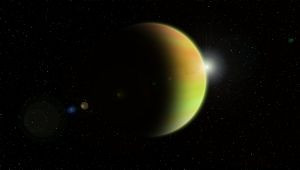An alien world might be buried inside Earth, reveals a new study.
Scientists speculate in the new study that Earth was formed by a Mars-sized planet called Theia, and that chunks of the alien planet might still be found in Earth’s core, Popular Mechanics reports.
According to a team led by Arizona State University geodynamics researcher Qian Yuan, it is likely that Theia also helped in the formation of the moon. The theory was presented by the team earlier this month at the 52nd Lunar and Planetary Science Conference 2021.
They explained in a paper, “Here, we demonstrate that Theia’s mantle may be several percent intrinsically denser than Earth’s mantle, which enables the Theia mantle materials to sink to the Earth’s lowermost mantle and accumulate into thermochemical piles that may cause the seismically-observed [dense areas].”
These dense zones are “continent-sized Large Low Shear Velocity provinces (LLSVPs).”
“We define successful models in which the [Theia mantle materials] sink to the lowermost mantle and form into spatially isolated thermochemical piles that occupy 3-15% area of the 2D model domain, similar to the present-day LLSVPs which occupy 3-9 vol% of the Earth’s mantle.”
On the basis of geodynamic models and isotopic evidence, the team believes two mysterious dense zones 1,000 miles beneath the Earth’s surface are “left-over Theia mantle materials," reported Huffpost.
The dense areas are located under West Africa and the Pacific Ocean.
In 2016, a study suggested that Earth could be two planets -- itself and Theia -- that came together after a collision. “Theia was thoroughly mixed into both the Earth and the moon, and evenly dispersed between them,” author Edward Young, a professor at the University of California, Los Angeles, said in a statement at the time.
But Yuan of Arizona State University and his teammates feel they have now located the actual portions of Theia inside Earth. “You could say that these are the biggest and largest meteorites if they are mostly Theia’s mantle. It’s very cool," he said.

© 2025 Latin Times. All rights reserved. Do not reproduce without permission.



